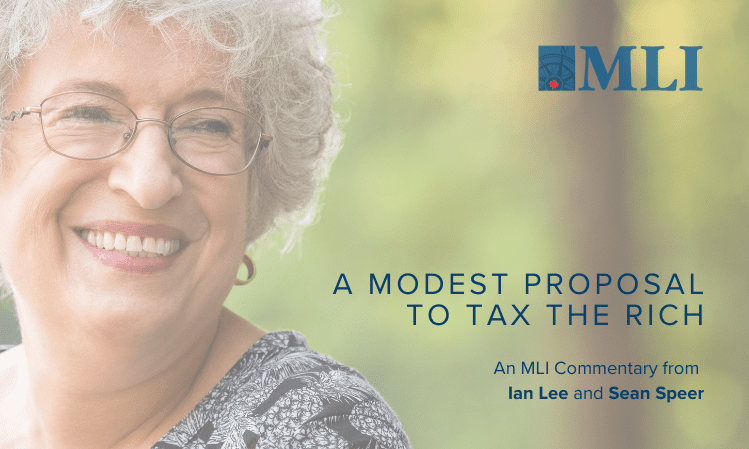In 2016, Ian Lee and Sean Speer offered a tongue-in-cheek prescription for Ottawa’s burning desire for wealth redistribution: tax seniors!
Little has changed in the past eight years. Ottawa is still preoccupied with rising income inequality and appealing to voter demographics over policy that could create the conditions for rising living standards and social mobility irrespective of age or income. With the renewed debate over increasing old age security, MLI felt it was time to re-issue this Commentary.
PRESS RELEASE
OTTAWA, May 26, 2016 – These days, Ottawa’s major preoccupation is perceived rising income inequality. But even Canada’s newly-elected government – which has promised to raise taxes for the rich in order to support the middle class – isn’t doing enough.
If the government really wants to redistribute income it should go after the disproportionate beneficiaries of government programs and spending: Seniors!
Ian Lee and Sean Speer satirize the redistributionist mania that has taken hold in Ottawa in a new commentary for the Macdonald-Laurier Institute. The authors, their tongues firmly in cheek, say the time has come to set aside the perception of financial challenges for seniors and raise their taxes.
“There is a tendency to view seniors as a vulnerable population”, write Lee and Speer. “The facts tell a different story”.
Of course, the authors aren’t actually proposing a Seniors Tax. Instead they are attempting to highlight the contradictions of federal policy by taking arbitrary and vague concepts like fairness to their logical conclusion.
Not only are seniors wealthier than younger Canadians, they are the disproportionate beneficiaries of government programs and spending. A Seniors Tax would therefore go a long way to offset the “reverse ageism” – that is, a bias in favour of older rather than younger Canadians – inherent in government spending and taxation policy.
Lee and Speer show in detail how seniors have disproportionately benefited from government redistribution. And they will do so even more now that the government has reversed such measures as income splitting for younger families and raising the age for Old Age Security.
It was only a few decades ago that Canadian seniors fared poorly relative to seniors in other countries according to key indicators such as income replacement, accumulated wealth and poverty rates. But that is not the case now. Consider that:
- Canadian seniors’ wealth has grown much faster than younger Canadians’, nearly quadrupling since 1984.
- Incidence of low income among seniors fell from 21.3 percent to 5.4 percent between 1980 and 2006.
- The federal government is increasing spending on seniors at a rate of $12 billion per year.
- Canada has been ranked as one of the least “intergenerationally just” jurisdictions in the world.
The evidence would thus suggest that the government’s redistributionism should have focused on transferring income and wealth from seniors to younger Canadians.
Instead, Ottawa doubled down on helping out seniors in its most recent budget! Returning the Old Age Security eligibility age to 65 will add significant cost over the long term for a group that barely needs it.
Setting aside the satire, Lee and Speer argue Ottawa should take a different tack than more redistribution. Instead, they say, Ottawa should look at a broad-based economic policy agenda that creates the conditions for rising living standards and social mobility irrespective of age or income.
Ian Lee teaches strategic management at Carleton University’s Sprott School of Business.
Sean Speer is a Senior Fellow at the Macdonald-Laurier Institute. He previously served in different roles for the federal government including as senior economic adviser to the Prime Minister and director of policy to the Minister of Finance.





